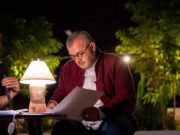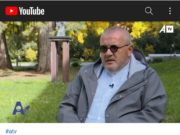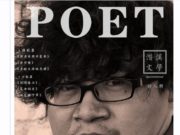MERCEDES ROFFÉ is one of Argentina’s leading poets. Widely published in Latin America and Spain, some of her books have been published in translation in Italy, Quebec, Romania, France, Brasil, England and the United States. She is the founding editor of Ediciones Pen Press, a New York-based independent press dedicated to the publication of contemporary poetry. Roffé holds a diploma in Modern Languages from the University of Buenos Aires, and a Ph.D. from New York University. She is frequently invited to read from her work at international events and academic settings around the world. She was awarded a John Simon Guggenheim Fellowship (2001) and a Civitella Ranieri Foundation Fellowship (2012).
MERCEDES ROFFÉ
Three Poems from Ghost Opera
Translated from the Spanish by Judith Filc
PROSPERO’S BOOKS
(M. Nyman)
To walk. To walk.
Light, light in the altitude
moon metal, cut
in the sharpness of silence
silver winches
hoarse
wandering of falconry
and like spurs, thorns
(in the soul)
Was it time already? Was
that field the chased, desired
era?
Someone sings. Someone answers
someone yet rises
high up on one’s strings
(as if nobody listened)
To walk. To walk.
The rigor of a profile
and a shadow
ride back into memory.
What will rescue them,
return them to the clear
surface of the day?
Something, however, returns
like a relentless, austere melody
broken up overtones
in the winged specter
the crystal fantasizes
It returns
the voice
returns
against the exhausted
drone bass
of childhood
–failed land.
To hear. Nothing but hearing
giving ear as if
surrendering
one’s will to the wind
–or to a less trustworthy friend.
Rapture. A fate of violence
or at least confusion.
It wasn’t required. It wasn’t
necessary. Or does the
pealing of the clock
adjust to absence?
The hours retreat like Tullia
over her lute or the tempered instrument
in the folds of Tullia, of her skirt.
Something, of both, moans. Something
takes fright. Something lets itself
be lost
in stifled agony.
In the gleam of dawn
a shadow recurs, rises.
Might it be Dido
crying out? Duped
shamaness
wrapped
forever
on the lap of a birch
To walk. To walk.
To cross the woods at night.
An exhausted tread
a fearful
dark tread
Treacherous moon, don’t lie!
Don’t deceive me!
Night children-crows choir,
silence!
A radiant bird traverses the sky
marsh of desire
how to
catch its flight?
To walk. To walk.
To draw in one’s memory
a horizon
and voyage toward it.
A faith or hope like a nest
to return to
Transparency
of wheat,
remember?
The wind stroked
your blond head.
To walk? to walk?
what to?
where to?
Field, plain
let me
rest
Let me spend the
night here
in the loving hollow
of your lap
TEHILLIM
(S. Reich)
I remember once when I was a young boy, riding in a car with my mother, I said to her: “Even when you’re scolding me and I’m scared and unhappy, at the same time I’m singing a little song in my head.
Richard Foreman
What a gallop. What a
thundering of hoofs,
castanets, rain-
stick like the echo
of a minute jungle
stored in the heart
of another jungle.
The women, meanwhile,
sing
What?
their song always
in a foreign tongue
And yet
who would say they don’t
sing? More:
who would dare
say
there isn’t in their song
a certain joy?
(really?)
Or wouldn’t that be
life the
GLOOOOOIIIIIIRRE
Epur
si…
CANTA
Or wouldn’t there be a certain
unruly
insistence in that business of
surviving?
Says the psalmist:
“There is no speech there are no
[words
yet even so his voice is heard”
“Pious with the pious
upright with the upright
Pure with the pure
and subtle with the crooked”
Tell me, what are those bells
that toll
every time a bird takes
flight
low
very low
over the beach
(or are those other waters?)
They still sing
the women
sing
and clap
and their fingertips
firmly
hit
against the skin
of the drum
They call. Each other.
How in tune
those voices are
in their gentle battle
It rains. It rains.
The rain
blesses them
while
the psalmist says:
“There is no speech there are no
[words
yet even so his voice is heard “
“Pious with the pious
upright with the upright
Pure with the pure
and subtle with the crooked”
OLD POLISH MUSIC
(H. M. Góreki)
Ancient music
beloved ancient Music
beloved silence
beloved camerata
ancient
metallic and luminous
BRASS
like arms
groping
the air
the countryside
beautiful things has love given the soil
They scream. Chat?
Might they not understand each other?
Might they be misled by
the wind?
Dry
stuttering
hollowness
spasmodic howling
the fingertips, however
brush
a triumphant air
–If what bursts in is…
there will be no haste
Rather
a volley
and then
THEN
a temple
dazzling
like a promise of
decay
MERCEDES ROFFÉ
from La ópera fantasma
(España/México, Vaso Roto, 2012)
PROSPERO’S BOOKS
(M. Nyman)
Caminar. Caminar.
Lumbre, lumbre en la altura
metal de luna, corte
en lo afilado del silencio
cabrestantes de plata
ronco
vagar de cetrerías
y como espuelas espinas
(en el alma)
¿Era ya la hora? ¿Era
el campo aquel la era perseguida
deseada?
Alguien canta. Alguien responde
y alguien aun se empina
en lo alto de sus cuerdas
(como si nadie oyera)
Caminar. Caminar.
El rigor de un perfil
y una sombra
cabalgan hacia atrás en la memoria
¿qué los rescatará, qué
los devolverá a la clara
superficie del día?
Algo, sin embargo, vuelve
como una melodía implacable, austera
armónicos descompuestos
en el alado espectro
que fantasea el cristal
Vuelve
la voz
vuelve
contra el bajo continuo
exhausto
de la infancia
—tierra fallida.
Oir. No hay más que oir
prestar oídos como quien
entrega
al viento su voluntad
—o a menos confiable amigo.
Arrebato. Un sino de violencia
o al menos confusión.
No era preciso. No era
necesario. ¿O acaso
el tañer del reloj
se acompasa a la ausencia?
Se repliegan las horas sobre sí como Tulia
sobre su laúd o el templado instrumento
en los pliegues de Tulia, de su saya.
Algo gime, de los dos. Algo
se espanta. Algo se deja
perder
en una ahogada agonía
En el relumbre del alba
una sombra renace, se levanta
¿Dido será
la que reclama? Shamanesa
burlada
arrebujada
por siempre
en el regazo de un haya
Caminar. Caminar.
Atravesar en la noche la foresta.
Un andar extenuado
temeroso
oscuro andar
¡Falsa luna, no mientas!
¡No me engañes!
Nocturno coro de niños cuervos
¡callar!
Cruza el cielo un pájaro de luz
tembladeral de deseo
¿cómo
atrapar su vuelo?
Caminar. Caminar.
Dibujar en la memoria
un horizonte
y partir en su busca.
Una fe o ilusión como un nido
al cual volver
Diafanidad
trigal
¿recuerdas?
El viento te pasaba la mano
por la rubia cabeza.
¿Caminar? ¿caminar?
¿hacia qué?
¿hacia dónde?
Campo, llanura
déjame
descansar
Déjame hacer
noche aquí
en el amoroso hueco
de tu falda
TEHILLIM
(S. Reich)
I remember once when I was a young boy, riding in a car with my mother, I said to her: “Even when you’re scolding me and I’m scared and unhappy, at the same time I’m singing a little song in my head.
Richard Foreman
Vaya galope. Vaya
retumbar de cascos
castagnettes, palos
de lluvia como el eco
de una selva minúscula
guardada
en el corazón de otra selva.
Cantan, mientras tanto,
las mujeres
¿Qué?
su canto siempre
en una lengua extranjera
Y sin embargo
¿quién diría que no
cantan? Más:
¿quién osaría
decir
que no lleva su canto
un algo de alegría?
(¿de verdad?)
O acaso no será eso
la vida la
GLUUUUUAAAARRR
Epur
si…
CANTA
¿O no hay acaso una cierta
indócil
insistencia en eso de
sobrevivir?
Dice el salmista:
“Sin habla y sin palabras
aun así su voz se oye”
“Piadoso con el piadoso
recto con el recto
Puro con el que es puro
y sutil con el ruin”
Dime ¿qué campanas son esas
que repican
cada vez que un pájaro inicia
su vuelo
bajo
muy bajo
sobre la playa
(¿o acaso son otras aguas?)
Cantan aún
cantan
las mujeres
y baten palmas
y firmes
dan
las yemas
contra el parche
del tamboril
Llaman. Se llaman.
Cómo
se entienden esas voces
en su suave batalla
Llueve. Llueve.
La lluvia
las bendice
mientras
dice el salmista:
“Sin habla y sin palabras
su voz se oye”
“Piadoso con el piadoso
recto con el recto
Puro con el que es puro
y sutil con el ruin”
OLD POLISH MUSIC
(H. M. Góreki)
Música antigua
querida Música antigua
querido silencio
querida camerata
antigua
metálica y luminosa
BRONCES
como brazos
tanteando
el aire
la campiña
bellas cosas ha dado el amor al suelo
Ellos gritan. ¿Conversan?
¿Será que no se entienden?
¿Será que los confunde
el viento?
Seco
tartamudeo
de oquedades
espasmódico aullar
las puntas de los dedos, sin embargo
rozan
un aire de triunfo
—Si lo que irrumpe es….
no habrá premura
Más bien
un metralleo
y luego
LUEGO
un templo
relumbrante
como una promesa de
caducidad


















